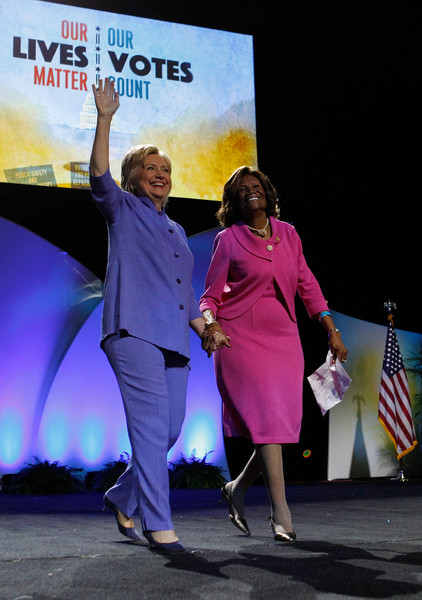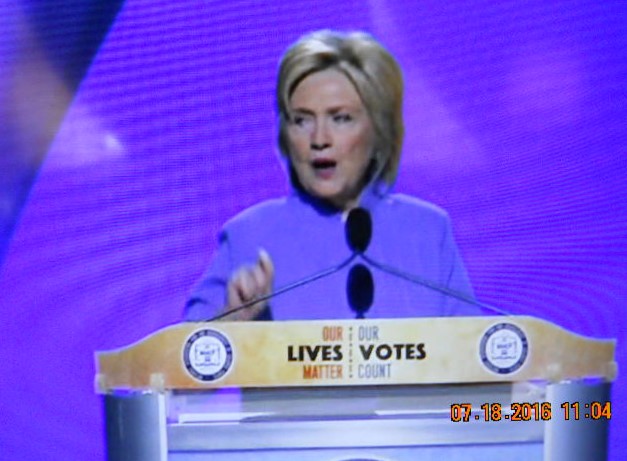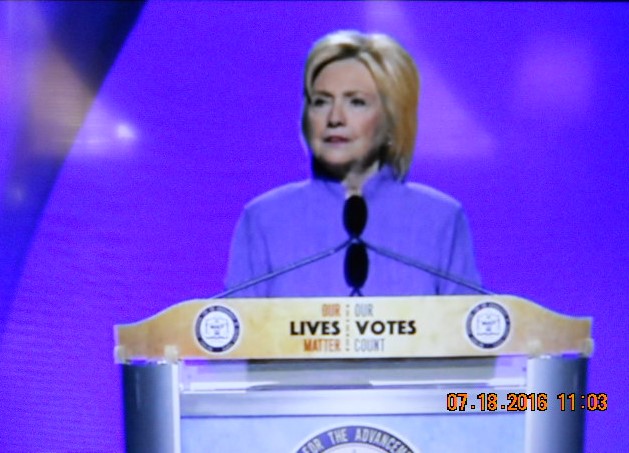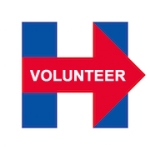“Hello, NAACP! It is so good to be here with all of you.
I
want to start by thanking my longtime friend and colleague, my
collaborator, and partner, and so many important causes; Hazel Dukes is a
treasure. A treasure not only for New York, but for the NAACP and for
our country. Thank you so much dear Hazel.
I want to thank your
Chair, Rosyln Brock. Thank you so much Madame Chair. Your President and
CEO Cornell Brooks, and everyone here today, including all the elected
officials who have already appeared before you and those who will be
addressing you during this convention.
And I have to start by
saying we all know about that other Convention happening up in Cleveland
today. Well, my opponent in this race may have a different view, but
there’s nowhere I’d rather be than right here with all of you.
For
more than a century, you’ve been on the frontlines, pushing America to
become a better, fairer country. You and your noble predecessors have
marched, sat in, stood up and spoke out – all to bring us closer to our
founding ideals of equality for all.
And yes we have made
progress, we see the results: in classrooms where children of all races
learn side by side; in boardrooms and break rooms, where workers of all
backgrounds are able to earn a living and support their families; at
every level of government, where more and more the people we elect to
represent America actually look like America.
And, of course, in the White House, with our wonderful President and First Lady and their daughters, Barack and Michelle Obama.
So
as the President has said, and indeed, as he exemplified, we’ve come a
long way. But you know – and I know – that we have so much further to
go.
We were cruelly reminded of that with the tragic deaths of
Alton Sterling and Philando Castile, two more black men killed by police
incidents, this time in Louisiana and Minnesota. And then in Dallas,
five police officers killed while serving and protecting peaceful
protestors, targeted because they were police.
And we saw it again
just yesterday, when three police officers were shot in an apparent
ambush in Baton Rouge. This madness has to stop.
Watching the news
from Baton Rouge yesterday, my heart broke not just for those officers
and their grieving families, but for all of us. Because we have
difficult, painful, important work ahead of us to repair the bonds
between police and communities, and between and among each other. We
need one another to do this work. And we need leaders like the NAACP.
We need police officers to help us do this work. These murders threaten
all of that.
Killing police officers is a terrible crime. That’s
why our laws treat the murders of police so seriously because they
represent the rule of law itself. If you take aim at that, you take aim
at all of us. Anyone who does it and anyone who helps must be held
accountable. And as president, I will bring the full weight of the law
to bear in making sure that those who kill a police officer are brought
to justice. There can be no justification. No looking the other way.
We all have to make sure and pray it ends.
The officers killed
yesterday in Baton Rouge were named Montrell Jackson, Matthew Gerald,
Brad Garafola. When they died, they were responding to a call about a
man with a gun. How many families, how many more families, would pay
the price if we didn’t have brave men and women answering those calls?
That’s why I’m haunted by the images of what the officers were doing in
Dallas when they died. Protecting a peaceful march, talking with the
protestors. Where would our democracy be without courageous people
willing to do that?
So we all need to be partners in making law
enforcement as secure and effective as it needs to be. That means
investing in our police – in training on the proper use of force,
especially lethal force. How to avoid using force to resolve incidents.
Officer
safety and wellness – everything they need to do their jobs right and
rebuild trust with their communities. I’ve said from the beginning of
my campaign, that will be my priority as President.
Perhaps the
best way to honor our police is to follow the lead of police departments
across the country striving to do better. The deaths of Alton and
Philando drove home how urgently we need to make reforms to policing and
criminal justice — how we cannot rest until we root out implicit bias
and stop the killings of African Americans.
Because there is, as
you know so well, another hard truth at the heart of this complex
matter. Many African Americans fear the police. I can hear you, some of
you in this room. And today there are people all across America sick
over what happened in Baton Rouge and in Dallas. But also fearful that
the murders of police officers mean that vital questions about
police-community relations will go unanswered.
Now that is a
reasonable fear isn’t it? All of this tells us very powerfully that
something needs to change. Many police officers across the country agree
with that. There’s a real opportunity here for cooperation.
But
that can only happen if we can build trust and accountability. And let's
admit it. That gets harder every time someone else is killed.
So
now is the time for all good people who agree that the senseless
killings must end to stand up, speak out loudly and clearly. I know that
the NAACP, and so many of you individually, will do all you can to help
our nation heal and start the work together to meet these challenges.
We
must reform our criminal justice system because everyone is safer when
there is respect for the law and when everyone is respected by the law.
And
let's admit it, there is clear evidence that African-Americans are
disproportionately killed in police incidents than any other group. And
African-American men are far more likely to be stopped and searched by
police, charged with crimes, and sentenced to longer prison terms than
white men convicted of the same offenses. These facts tell us something
is profoundly wrong. We can’t ignore that. We can’t wish it away. We
have to make it right.
That means end-to-end reform in our
criminal justice system – not half-measures, but a full commitment with
real follow through. That’s why the very first speech I gave in this
campaign, back in April of 2015 was about criminal justice reform. And
the next President should make a commitment to fight for the reforms we
so desperately need. Holding police departments like Ferguson
accountable. Requiring accurate data on in-custody deaths, like Sandra
Bland. Creating clear, national guidelines on the use of force,
especially legal force. Supporting independent investigations of fateful
encounters with the police. So I pledge to you, I will start taking
action on day one and every day after that until we get this done.
And
you know what? When the 24-hour news cycle moves on, I won’t. This is
too important. This goes to the heart of who we are. This is about our
character as Americans. That’s why we also need to fix the crisis of
mass incarceration. Eliminate the disparity in sentencing between crack
and powder cocaine. Dismantle the school-to-prison pipeline that starts
in school and diverts too many African American kids out of school and
into the criminal justice system, instead of giving them the education
they deserve to have. And we need to do, all of us need to do – and I
look forward to working with the NAACP – we need to do a much better job
of helping people who’ve paid their debt to society find jobs and
support when they get out.
America is well known, and we want to
be a land of second chances – but so many Americans never had a first
chance to begin with. So let’s give everyone a fair chance at
rebuilding their lives. As Abraham Lincoln said, ‘Give everyone a fair
chance in the race of life.’ My plan would make significant investments
in reentry programs for the formerly incarcerated. And I will ‘Ban the
box’ in the federal government. People deserve a real shot at an
interview instead of being told ‘No,’ right out of the gate.
Then
beyond criminal justice, we must, we must fight for commonsense reforms
to stop gun violence. This is by far, gun violence, by far the leading
cause of death for young African-American men, outstripping the next
nine causes of death combined. The wrong people, the wrong people keep
getting their hands on guns. And not just any guns – military weapons,
like the kind the Dallas shooter had, which allowed him to outgun the
police.
That’s why the Cleveland police, yesterday, demanded that
the state suspend open carry of guns on the streets during the
Republican National Convention. And last week, the extraordinary and
inspiring Dallas police chief, Chief Brown, told lawmakers, ‘Do your
job. We’re doing ours,’ he said. He’s right. When he went on to say
we’re putting our lives on the line. We’ve got to do better.
People
who should care about protecting of police officers should be committed
to getting assault weapons off the streets to start with. And they
should join us in instituting comprehensive background checks because
law enforcement officers are nearly 50 percent, nearly 50 percent, less
likely to be killed in states where there are checks on the purchase of
handguns.
But even if we succeed in passing these laws and implementing them, we’ve got to go even further than that.
We
need to do something about the racial inequities in our healthcare
system. Right now, black kids are 500 percent more likely to die from
asthma than white kids – 500 percent! Right now a black baby in South
Carolina is twice as likely to die before her first birthday as a white
baby. Imagine if those numbers were reversed, and it were white kids
dying. Imagine the outcry and the resources that would flood in.
And
let’s do everything we can to create more jobs in places where
unemployment remains stubbornly high after generations of
underinvestment and neglect. I’m a big fan of Congressman Jim Clyburn’s
‘10-20-30’ plan – steering 10 percent of federal investment to
neighborhoods where 20 percent of the population has been living below
the poverty line for 30 years.
That should go nationwide because
the unemployment rate among young African Americans is twice as high as
for young white people. And because of that, my plan also includes $20
billion aimed specifically at creating jobs for young people. If you
don’t get that first job, it’s hard to get the second job, and it’s hard
to build that solid financial base.
And because of the Great
Recession, the median wealth for black families is now just a tiny
fraction of the median wealth for white families. That’s why my plan
includes steps to help more African-American families buy a home, which
has always been one of the surest ways to build wealth and security for a
family.
We will do more to support black entrepreneurs get access
to capital. And I want to give a shout out to black women, who
represent the fastest-growing segment of women-owned businesses in
America.
I want to unleash all of that energy and all of that
talent. We need to view all of these issues also as part of the struggle
for civil rights. Rosa Parks opened up every seat on the bus: our
challenge now is to expand jobs so that everyone can afford the fare.
And let’s ensure that the bus route reaches every neighborhood, and
connects every family with safe, affordable housing, good jobs, and
quality schools.
Now, I know none of this will surprise those of
you who know me. I’ve got a lot of plans. You can go to my website,
Hillary-Clinton-dot-com and read our full agenda.
Because you see,
I have this old-fashioned idea: if you’re running for President, you
should say exactly what you want to do and how you will get it done. I
do sweat the specifics because I think they matter. Whether one more
kid gets health care, one more person finds a job, or one more woman
entrepreneur gets access to capital to follow her dream – those just may
be details in Washington, but it really matters to those people and
their families.
And the truth is, we need to plan because we face a
complex set of economic, social and political challenges: they’re
intersectional; they’re reinforcing. We’ve got to take them all on. We
can’t wait and just do one at a time.
But the answers won’t just
come from Washington. Ending systemic racism requires contributions
from all of us – especially, especially those of us who haven’t
experienced it ourselves.
I’ve been saying this for a while now –
and I’m going to keep saying it, because I think it’s important. We
white Americans need to do a better job of listening when African
Americans talk about the seen and unseen barriers you face every day.
We need to recognize our privilege and practice humility, rather than assume that our experiences are everyone’s experiences.
We
all need to try, as best we can, to walk in one another’s shoes – to
imagine what it would be like to sit our son or daughter down and have
‘the talk’ about how carefully they need to act around police because
the slightest wrong move could get them hurt or even killed.
Let’s
also put ourselves in the shoes of police officers, kissing their kids
and spouses goodbye every day and heading off to do a dangerous job that
their families pray will bring them home safe at night. Empathy works
both ways. We’ve got to try to see the world through their eyes, too.
When
you get right down to it, that’s what makes it possible for people from
every background, every race, every religion, to come together as one
nation. It’s what makes our country endure.
And in times like
these we need a President who can help pull us together, not split us
apart. I will work every single day to do just that. And what I’m about
to say, I say with no satisfaction, the Republican nominee for
President will do the exact opposite.
He might say otherwise if he were here. But of course, he declined your invitation.
So all we can go on is what he has said and done in the past.
Donald Trump led the movement to de-legitimize our first black president, trumpeting the so-called ‘birther’ movement.
Donald
Trump plays coy with white supremacists. Donald insults Mexican
immigrants, even an American judge born of Mexican heritage. Donald
Trump demeans women. Donald Trump wants to ban an entire religion from
entering our country.
And Donald Trump loves to talk to the
press. But let’s not forget, let us not forget: the first time Donald
Trump was quoted in The New York Times was in 1973, when the Justice
Department went after his company for refusing to rent apartments to
African Americans.
It was one of the largest federal cases of its
kind at the time. And when federal investigators spoke with Trump’s
employees, they said they were instructed to mark rental applications
from black people with a ‘C.’ A ‘C’ for colored.
By now, we’ve heard a lot of troubling things about Donald Trump but that one’s shocking.
This
man is the nominee of the Party of Lincoln. And we are watching it
become the Party of Trump. And that’s not just a huge loss to our
democracy – it is a threat to our democracy.
And it all adds up,
it all adds up to an undeniable conclusion: I don’t care if you’re a
Democrat, a Republican, an Independent — Donald Trump cannot become
President of the United States.
And that’s why we’ve got to work together to get out the vote this fall.
You know that better than anyone. That’s why the theme of this conference is ‘Our Lives Matter, Our Votes Count.’
I agree with both of that. And now I think your votes count more than ever.
That’s
why we’ve got to stand up against any attempt to roll back the clock on
voting rights. Encourage everyone, everyone we know to stand up and be
counted in this November election.
As Dr. King said, ‘Our lives
begin to end when we become silent about things that matter.’ None of
us, none of us, can afford to be silent with so much at stake.
That’s
why, here today, I am pleased to announce a nationwide drive to get 3
million people to register to vote and to commit to vote in this
election.
We are hosting more than 500 registration events this
week, across the country. We’re going to minor league baseball games,
college campuses, barbershops, hair salons, street corners. And with
those we cannot connect with in person, we’ve created an online, one
stop shop registration tool, in English and in Spanish.
And my
team in Ohio wanted me to make sure you all know that we’re hiring. We
actually have a recruiter here today – he’s got a table set up in the
hall. We’re hiring paid organizers to help us get out the vote and get
our message out all across Ohio. So please spread the word – we want
great people on our team. That’s the way we’re going to be successful.
We’re not the red team or the blue team, we’re the American team, and
it’s time we start acting like it.
I have no doubt we can rise to
meet these challenges if we stand together-- no doubt at all. And if we
are looking for inspiration, let’s go to one of the officers killed
yesterday. 10 days ago, Montrell Jackson, a young African American
police officer in Baton Rouge, posted a message on Facebook, he wrote so
honestly and powerfully about the struggle of being black and wearing
blue in today’s America.
‘I’m tired,’ he wrote, ‘in uniform I get
nasty, hateful looks, and out of uniform, they consider me a threat.’ He
went on, ‘These are trying times, please don’t let hate infect your
heart. I’m working in these streets, so any protesters, officers,
friends, families, or whoever, if you see me,’ Montrell said, ‘and need a
hug, or want to say a prayer, I’ve got you.’
That, my friends, is
the strength of America. Men like Montrell Jackson. Despite all our
challenges, that spirit of love and community must guide us still. We
have to heal the divides that remain, make the United States what it
should be, stronger and fairer. More opportunity for every one of our
people. I would not be standing here on the brink of accepting the
Democratic nomination if I did not believe, if I did not in my heart
believe, that America’s best years are still ahead of us. So let us go
forward with faith, with confidence, with optimism. Our children and our
grandchildren deserve no less.
Thank you, God bless you and God bless the United States of America.”





















